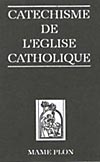

![]()
![]()
|
COMPRISING FIVE ARTICLES:
This is a new document, which is absolutely revealing and characteristic in its whole representation that is the new Catechism of the Catholic Church. You will see that it is more the Catechism of the Conciliar Church.... The three functions of the Catholic Church have now finally all been "codified" by the Conciliar Church with the publication of this new Catechism. For the sanctification of souls we have the novus ordo missae; for the governance of souls we have the New Code of Canon Law; for the teaching of souls we have the New Catechism. We can expect that this Catechism is in the same line as the Second Vatican Council, and it is. Now I have to remark that there are excellent texts in this Catechism, and there are some exposals, for example, they speak once again about the Real Presence, Transubstantiation, etc. Well, astonishing things. But, this Catechism first of all is not a Catechism in question and answer form. It gives no definitions. It describes, it exposes, it gives sources, but there are no definitions, which is absolutely characteristic for the modernists who do not want clear notions. They hate the scholastic system. That's the first thing, which is very characteristic. The second point is that we find all the directives and ideals of the Vatican Council in this Catechism. So, for example, ecumenism (#819). It is said that the text here is taken word for word from the Council (Unitatis Redintegratio), where it is said that the Spirit of Christ has deigned other ecclesiastical communities to be means of salvation...you find the same spirit regarding mixed marriages (#1636): "So there is no insurmountable obstacle if either of the two partners in the mixed marriage brings it what he has received in his own community. The one must learn from the other the manner in which he lives his fidelity to Christ." So, you see the spirit of relativism. The same question appears regarding religious liberty (#2104), which is taken from Dignitatis Humanae, which says that man has a natural right not to be hindered in publicly exercising his false religion. This was proclaimed by Vatican II and this we find exactly, once again, in the new Catechism. This Catechism has humanistic aspects, for example, the dignity of the human person. I never read before in a Catechism a chapter on this. In this Catechism too, we read in the beginning the first chapter, "Man is capable of God." If you look at a traditional Catechism it will begin with the Creed; it explains what is the Faith; and then it is "Credo in unum Deum. " God is first. But the new Catechism speaks first of all about the psychological and philosophical qualities of man. The first aspect is man, not God. Regarding marriage, the Catechism echoes Gaudium et Spes of Vatican II. It inverts the proper ends of marriage citing first mutual love of the spouses, then, procreation and education, instead of the reverse. Another astonishing thing is its treatment of the Mass as a sacrifice of adoration, praise, and thanksgiving, but practically no word about the Mass as a sacrifice of propitiation. And, that is precisely the line between Catholic and heretic. Is the new Catechism an infallible act of the Ordinary Magisterium of the Church? Well, it's the same as the Second Vatican Council. If it is the Magisterium Ordinarium of the Church, it is infallible as long as it is in conformity with Tradition. And since we see that there are deviations in doctrine, we must say that in these points they are not infallible. So we have to criticize by interior criterion this Catechism as we do for the second Vatican Council. It is exactly the same. The Magisterium Ordinarium is infallible in so far as it is in conformity with Tradition, and concerning Traditional doctrines. If there is a deviation it cannot be infallible. And, so, it is not an infallible act of the Ordinary Magisterium. |

